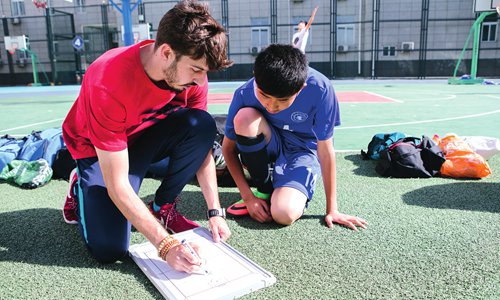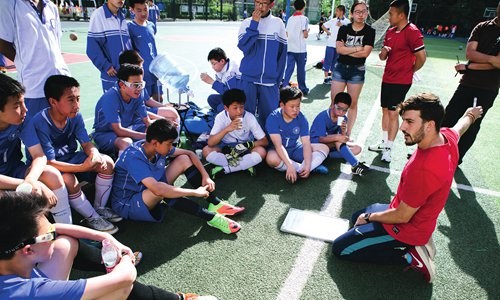
Llompart teaches a student how to get into the right position on the field. (Photo: Li Hao/GT)

Young football players listen to Llompart's guidance during halftime. (Photo: Li Hao/GT)
Even though a slight sandstorm was predicted in the afternoon, Daniel Llompart still hopped on a bike and made it to school on time. The scheduled physical education (PE) class was not cancelled, and following the class would be a soccer tournament among the neighboring middle schools.
Llompart, 30, is a Spanish soccer teacher who has been assigned by Beijing's education department to help Chinese PE teachers in soccer training at The Middle School Attached to Northern Jiaotong University.
His arrival in China coincides with the country's larger plan to introduce foreign soccer coaches and talents to local primary and middle schools, with an aim to help raise the soccer levels of China's youth.
The plan is to hire around 120 foreign soccer coaches to coach across the country in 2017 as a way to further deepen the international cooperation in soccer development, according to the country's Ministry of Education.
The PE class
Llompart, who was a professional player in Spain's soccer league, has had 12 years of experience in coaching youth soccer. RaySports, a Beijing-based company specialized in youth sports education and training, reached out to Llompart, and he came to Beijing to teach soccer six months ago. His brother, also a soccer coach, joined him on his journey.
Llompart had never imaged that one day he would be working in China teaching soccer. The first time he set foot on a local school's playground, he was surprised by how well established the soccer facilities in Beijing are.
"It impressed me that Beijing has some of the best soccer facilities. However, the children just don't want to play," he said.
"In Europe, you can see a lot of kids playing on the very small fields, and maybe 100 people playing with four or five footballs on the fields. But in Beijing, only a few children are playing soccer after school."
The major difference between Spain and Chinese youth soccer lies in the emphasis students have on sports. "In our country, kids have to study and practice sports at the same time. But in China, a lot of people just think of study and do not spare enough time for sports."
Llompart says that his career goal in China is to encourage more students to play soccer by showing them how to have fun on the fields.
Many schools in Beijing have adopted the module-based PE education system, in which girls and boys can choose different sports to learn and practice from their own preferences. The students in Llompart's class are all boys who selected soccer.
Playing little games was a large part of the PE classes he conducted at the school.
For example, one of Llompart's games is designed as "fish hunting" behaviors - students join hands to form "a net" in order to capture the fishes played by other students. The game helps children understand the importance of running to different points while keeping a shape on the field.
"I found that the soccer skills of students are on different levels. Some of them have played soccer for five years, some three years and some for one year," said Llompart. "So my training regime starts from the lower level to higher, practicing the basic skills first, and then passing the ball and changing to the next step."
The football matches
While Llompart started working with The Middle School Attached to Northern Jiaotong University, he also took the position as the coach of the school soccer team.
When the afternoon PE classes ended, the most exciting part of Llompart's workday came - coaching the soccer matches among the neighboring middle schools.
The matches ran with an eight-on-eight format, with 20 minutes for each half of the game. During one of the 40-minute games, the soccer team of The Middle School Attached to Northern Jiaotong University beat their competitor, The Third High School Attached to Beijing Normal University, 2:0.
The players were thrilled at their victory, but Llompart said winning or losing is not what matters to him.
"The more important point for me is that when you watch the match, you can see which team is trained by a Chinese guy and which team is trained by a Spanish guy," he said.
"I'm glad that the students understood what I want for them and are trying their best to do it."
Llompart has had about 14 classes per week at different schools in Beijing. He plans to further his coaching experience in China for two or three more years, and he is learning to speak Chinese.
Creating a balance
Speaking fluent English, 13-year-old Zhu Ziteng, a leading player on the soccer team of The Middle School Attached to Northern Jiaotong University, often acted as the assisting coach and translator for Llompart during training.
He said one of the main differences that Llompart has brought to the team is that the Spanish coach has made everybody on the field more active.
"In the past, the key players have more chances to get the ball to shoot as they are considered the core of the team. But now, everybody on the court is passing the ball together to create the best chance to score," he said.
"I feel like more students at my school are interested in playing soccer now," he said.
In China, most of the middle school players would stop playing soccer or other kinds of sports when they reached the third grade in order to get better prepared for the exams to enter high school. But Zhu, a first grader, said he doesn't want to quit soccer.
"I hope I can make a balance between study and soccer," he said.


















































